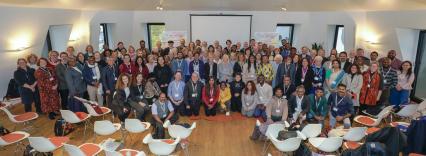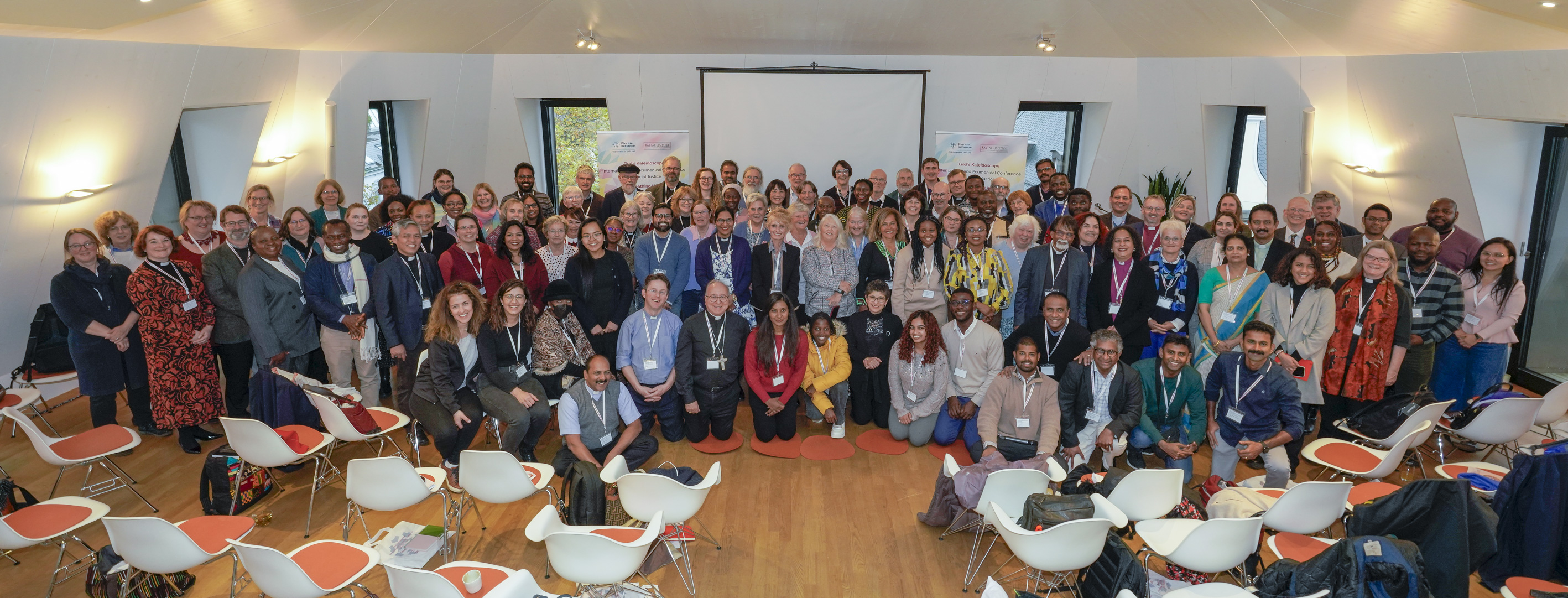Racial Justice Conference November 2023
“God’s Kaleidoscope”
We dream that the daring dreams of our generation will be the reality of our children.
We admit that our previous admissions of guilt have rarely been followed by atonement and reparation.
We are aware that we must turn our awareness of injustice into practice of justice.
Conference Statement
From 9th – 11th November 2023, Christians from the Church of England, in particular the Diocese in Europe, the Racial Justice Unit, the wider Anglican Communion, partner churches and organisations, in particular WCC and USPG, as well as other Christian Churches and personalities from other faiths worldwide, have gathered at Freiburg, Germany, to hold a conference on racial justice. 2 Participants were aware that the first day of their meeting held a tragic significance in the context of racial hatred, as 9th November 1938 – the ‘Reichsprogromnacht’ – made unambiguously visible the systematic persecution of Jews in Nazi Germany and the annihilation of Jewish life as its ultimate goal. Participants also expressed their agony at the ongoing and unbridled violence between peoples and nations, causing so much of loss of life and challenging dreams and hopes for justice and peace in our time.
They highlighted the wish for the conference to offer a sobering and discerning voice, and to restore confidence in the future. With this in mind, the Conference adopted the following Statement:
“So God created humans in His own image; in the image of God He created them; male and female He created them.” Gen 1:27
“There is neither Jew nor Greek, there is neither slave nor free, there is neither male nor female; for you are all one in Christ Jesus.” Gal 3:28
We, as Christians from different backgrounds have come together to:
- Better understand the detrimental impact racial prejudice and systemic racism have on personal dignity and opportunities to develop and thrive, in our communities and societies, and how they prevent us, as the Church, from becoming the community and the force we are called to be by God;
- More fully grasp how racism is a form of violence and how othering1 , structural bias and discrimination relate with manifold loss of lives: through violence, armed or frozen conflicts, terrorism, and war;
- Start feeling how prejudice, condescension, discrimination and humiliation – subtle or aggressive – affect real lives of real people, traumatise many of our sisters and brothers, and perpetuate pain and shame, fear, desperation and also anger;
- Strengthen and speed up what little movement for racial justice there already is in our Churches, making it more visible, impossible to ignore, and turn it into a major force of transforming our churches into models of how humankind should boldly embrace its diversity and see it as an opportunity rather than as an obstacle,
- Encourage and empower every person to take their fair share, claim their own space, take their position and fulfil their potential in life as a matter of course.
We therefore affirm, as our common theological basis, that:
- Racism is a sin and to justify it is a heresy because racism denies our common identity as God’s children. It is against God’s will to assign second class status to some of us based on random criteria such as race, caste, ethnicity, gender, sexual orientation or disability. All humans are equally loved by God and have a right to equal treatment by their fellow humans.
- It is our task to affirm our common identity as God’s children and dismantle those systems and structures which both overtly and covertly hinder us from recognising the image of God within each one of us.
- We as Christians must recognise diversity as integral to God’s design of and will for this world and affirm that, as baptised into the body of Christ, we are called to receive Christ’s promise of life in all its fullness for everyone – and be ‘born-against’ unjust systems that wish to keep it for a few.
- The tapestry of our lives must be interweaving, not just bumping up against each other: As people living in the ‘middle of that tapestry of different kinds of belonging, different layers of identity, and therefore also different levels of motivation and vision… the challenge is to take seriously that diversity of different sorts of belonging, without just making them rivals to each other’ (Rowan Williams).
- We affirm and celebrate the bonds of affection that bind us together, discovering how we form the body of Christ who has torn down the dividing walls of hostility between us (Eph 2.11) and made us all heirs of God and his co-heirs (Rom 8:17).
- Justice is God’s promise for a world in which wrongs are being righted, everyone’s right is being upheld, wounds are being healed, inequalities are levelled out, and peace is unfolding within all creation. Justice is an expression of God’s love, and those, who love, do justice and share what they have received.
“Execute judgment and righteousness, and deliver the plundered out of the hand of the oppressor. Do no wrong and do no violence to the stranger, the orphan, or the widow.” Jer 22:3
“Faith by itself, if it is not accompanied by action, is dead. As the body without the spirit is dead, so faith without deeds is dead.” James 2:17.26
Having listened carefully to all the experiences shared, all the pains and frustrations expressed, all the hopes voiced, we call upon our Churches to:
- Endorse, own and increase efforts, which have been promoted by a few for many decades, to move from vision to mission, not only paying lip service to equality and justice, but living it,
- Join together with all other agents of change for a better world that seems to change for the worse, and to prevent populists and nationalists from reclaiming spaces we had already believed to be liberated from repressive ideologies,
- Concede power and space to young people who claim their share in reshaping the church, not just viewing them as its future, but knowing and supporting them as part of the present,
- Take seriously the need for dialogue and cooperation with people of other faiths and beliefs, as injustice cannot be changed by Churches alone, even if they are united in their engagement,
- Show more courage and determination in proclaiming the gospel of love, justice and peace in word and in deed with greater confidence in and 4 commitment to what we know to be the truth and God’s will for this – God’s – world.
“Whoever conceals their transgressions will not prosper, but they who confess and forsake them will obtain mercy.” Prov 28:13
"Pay attention to yourselves! If your brother or sister sins, rebuke them, and if they repent, forgive them". Luke 17:3
Following deep discussions and respectful exchanges of views and experiences, we agree on the following conclusions for our Churches:
- The first step towards racial justice is to acknowledge existing injustices and their root causes. This must include an uncompromising analysis of current power structures, political, economic and ecclesial, and must include new injustices, in particular caused by ecological destruction and climate change, which follow from colonial continuities in a system based on submission and exploitation.
- The second step towards racial justice is understanding the impact of the sins of the past – such as enslavement and colonisation – on life in the present, and how they will also shape our future if we don’t consciously and resolutely change course.
- The third step towards racial justice is repenting of those sins, even those that we have not committed ourselves but from which we still draw privilege and status and power, and make amends for what amends can still be made, rectify what can still be rectified, restore what can still be restored, heal what can still be healed – even at a cost to ourselves.
- The fourth step towards racial justice is giving a voice to those who were not heard, visibility to those who were overlooked, a safe place to those who were excluded, and honour to those who were looked down upon.
- The fifth step towards racial justice is to then discover how this new diversity is a strength and source of life for our Churches. They are in deep need of renewal in order to survive and thrive.
“’For as the new heavens and the new earth which I will make shall remain before Me,’ says the Lord, ‘So shall your descendants and your name remain.’” Is 66:22
“Now I saw a new heaven and a new earth. And God will wipe away every tear from their eyes; There shall be no more pain, for the former things have passed away.” Rev 21:1.4
During our conference, we have experienced how deep encounters and discourses can transform the way we see each other, perceive each other and understand one another. We are encouraged by this realisation and recommend that our Churches follow our example and open up spaces for conscious exchanges on the theme of racial justice. We are convinced that racial justice must be the life breath and an essential element of all ecclesial bodies and church activities. As concrete measures to fill this claim with life we recommend that racial justice must:
- Be a regular and compulsory topic in all relevant deliberations and decision-making processes on all levels of Church organisation,
- Mandatorily be taken into account when analysing power structures and their impact on the promotion or prevention of change,
- In the Diocese in Europe of the Church of England be the subject of a study commissioned by the Diocesan Racial Justice Working Group to analyse power structures that have an impact on the promotion and/or prevention of change and the ability of our churches to be a prophetic witness to the Church and to the world,
- Constitute an integral part of education and training as well as all relevant material used therein, already starting with Sunday Schools (as it is easier to learn equality than to unlearn bias). In particular, it must specifically be included, both in theology and practice, in the training programmes for curates, for lay ministers, and in the lay discipleship courses; furthermore, racial justice must be integrated into all safeguarding training programmes,
- Be given visibility in our liturgies and prayers, through the inclusion of grieving for the injustices of the past, challenging unjust and biased hierarchies and stereotypes, prayers of repentance, and through reflecting the multicultural nature of God´s Church.
- Figure as an essential and prioritised item of the Churches’ public political and advocacy work, in particular in speaking out
- Against racism and discrimination in politics and society,
- Against the perpetuation of patriarchal systems of humiliation and oppression,
- For groups which are particularly vulnerable, such as Roma people and travellers, refugees and asylum seekers,
- For a revision of the global economic and trade systems, giving marginalised markets a real chance and safeguarding civil, political, social, cultural and ecological human rights.
Kaleidoscope Newsletters

Kaleidoscope Day 1

Kaleidoscope Day 2

